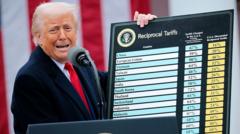**American soybean producers express fears over heavy tariffs and retaliatory measures impacting exports.**
**U.S. Farmers on Edge Amid Escalating Trade War with China**

**U.S. Farmers on Edge Amid Escalating Trade War with China**
**New tariffs threaten agriculture sector stability as market dependence grows**
April 10, 2025, 2:21 p.m. ET – The escalating trade conflict with China has cast a shadow over U.S. farmers, particularly soybean producers, who are warning that the latest round of tariffs imposed by the Trump administration could jeopardize farms across the nation.
The situation worsened when China announced retaliatory tariffs reaching 145 percent on American goods, prompting a dismissive response from Treasury Secretary Scott Bessent. His remark, “So what?” highlighted the administration's belief that the U.S. maintains a powerful negotiating position due to its greater purchasing power over Chinese goods. However, this confidence may be misplaced, as the potential consequences for American exporters loom large.
“American businesses that have thrived in the Chinese market now face significant barriers due to these tariffs,” remarked Sean Stein, head of the U.S.-China Business Council, signaling alarm that the situation could lead to a slowdown in trade across numerous sectors, including agriculture.
The heightened tariffs create a particular crisis for agricultural workers, especially in states that largely supported Trump's election. The president recently escalated U.S. tariffs on Chinese imports while also freezing reciprocal tariffs on other nations, a move that offers scant reprieve for farmers who depend on China as a critical export market. As the trade war drags on, many are left wondering how long their livelihoods can withstand the strain of geopolitical strife.
The situation worsened when China announced retaliatory tariffs reaching 145 percent on American goods, prompting a dismissive response from Treasury Secretary Scott Bessent. His remark, “So what?” highlighted the administration's belief that the U.S. maintains a powerful negotiating position due to its greater purchasing power over Chinese goods. However, this confidence may be misplaced, as the potential consequences for American exporters loom large.
“American businesses that have thrived in the Chinese market now face significant barriers due to these tariffs,” remarked Sean Stein, head of the U.S.-China Business Council, signaling alarm that the situation could lead to a slowdown in trade across numerous sectors, including agriculture.
The heightened tariffs create a particular crisis for agricultural workers, especially in states that largely supported Trump's election. The president recently escalated U.S. tariffs on Chinese imports while also freezing reciprocal tariffs on other nations, a move that offers scant reprieve for farmers who depend on China as a critical export market. As the trade war drags on, many are left wondering how long their livelihoods can withstand the strain of geopolitical strife.























